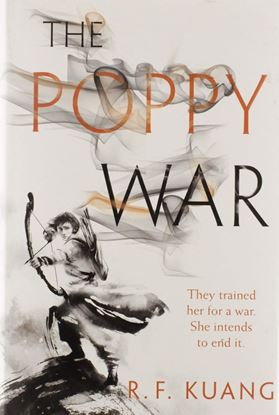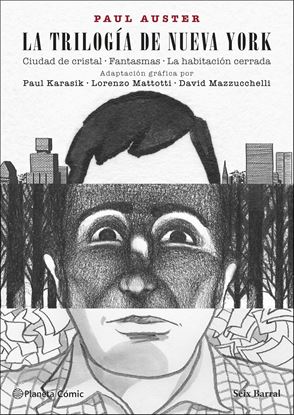

THE BURNING GOD (3) (HC)
Frodo and the Companions of the Ring have been beset by danger during their quest to prevent the Ruling Ring from falling into the hands of the Dark Lord by destroying it in the Cracks of Doom.
Now they continue their journey alone down the great River Anduin—alone, that is, save for the mysterious creeping figure that follows wherever they go.
This elegant hardcover—now available for the first time in the United States—is one of five Collector’s Editions of Tolkien’s most beloved works, and an essential piece of any Tolkien reader’s library.
1,995
WE ARE ALL GUILTY HERE
Until the night of the fireworks. When two teenage girls vanish, and the town ignites.
For Officer Emmy Clifton, it’s personal. She turned away when her best friend's daughter needed help—and now she must bring her home.
But as Emmy combs through the puzzle the girls left behind, she realizes she never really knew them. Nobody did.
Every teenage girl has secrets. But who would kill for them? And what else is the town hiding?
1,995
THE POPPY WAR (1) (HC)
When Rin aced the Keju—the Empire-wide test to find the most talented youth to learn at the Academies—it was a shock to everyone: to the test officials, who couldn’t believe a war orphan from Rooster Province could pass without cheating; to Rin’s guardians, who believed they’d finally be able to marry her off and further their criminal enterprise; and to Rin herself, who realized she was finally free of the servitude and despair that had made up her daily existence. That she got into Sinegard—the most elite military school in Nikan—was even more surprising.
But surprises aren’t always good.
Because being a dark-skinned peasant girl from the south is not an easy thing at Sinegard. Targeted from the outset by rival classmates for her color, poverty, and gender, Rin discovers she possesses a lethal, unearthly power—an aptitude for the nearly-mythical art of shamanism. Exploring the depths of her gift with the help of a seemingly insane teacher and psychoactive substances, Rin learns that gods long thought dead are very much alive—and that mastering control over those powers could mean more than just surviving school.
1,995
DODSWORTH (DESENGAÑO)
Inédita hasta ahora en español, pese a que está considerada una de las grandes novelas del premio Nobel de Literatura Sinclair Lewis, "Dodsworth" enfrenta los modales y la moral de los estadounidenses con la de los europeos durante el primer tercio del siglo XX. Ambientada en la Europa de entreguerras, narra el viaje por Europa de Sam Dodsworth, un empresario diseñador de automóviles, y su esposa, Fran Voelker, seducida por la frivolidad de la decadente aristocracia del antiguo continente, lo que comienza a separar al matrimonio. A lo largo de un itinerario por Francia, Gran Bretaña, Italia, Austria, Hungría, Alemania e incluso España, la pareja se va distanciando paulatinamente. Él se convierte en un turista solitario, mientras ella se involucra cada vez más en la ajetreada vida social de las grandes familias, que ocultan su ruina entre bailes de salón. Llevada al cine en 1936 por William Wyler, con Walter Huston y Ruth Chatterton como protagonistas, la película logró siete nominaciones a los Óscars.
1,995
ARTIFICIAL. UNA HISTORIA DE AMOR
¿Qué nos une con el pasado de nuestra familia?
Según Amy Kurzweil, conocer a alguien es como conocer un lenguaje. A través de un elaborado proceso de escritura que fluctúa entre el presente y el pasado, en este visionario cómic Kurzweil recoge la historia de tres generaciones de su familia, unidas por el amor, el arte y la inteligencia artificial en una búsqueda que quiere trascender los límites de la vida y desafiar los límites del tiempo.
1,995
LA TRILOGIA DE NUEVA YORK NOVELA GRAFICA
La adaptación a novela gráfica de La trilogía de Nueva York, la aclamada obra maestra de Paul Auster, una interpretación posmoderna del género policiaco en la que el lenguaje es el principal sospechoso.
En 1994, Ciudad de cristal, la primera de las tres historias que forman parte de La trilogía de Nueva York, tuvo una adaptación a novela gráfica que se convirtió de inmediato en un clásico de culto aplaudido por la crítica y el público, y que fue publicada en más de treinta países. Durante años, sus lectores han estado pendientes de que las otras dos últimas partes fueran llevadas al cómic. Por fin, la espera ha terminado.
La trilogía de Nueva York de Paul Auster es literatura posmoderna disfrazada de ficción noir, donde el lenguaje es el principal sospechoso. Como una reinterpretación de la literatura detectivesca y de misterio, cada libro explora diversos temas filosóficos. En Ciudad de cristal, un autor de novelas de detectives investiga un asesinato y acaba descendiendo a la locura. Fantasmas presenta a un detective privado llamado Azul que vigila a un hombre llamado Negro por encargo de un cliente llamado Blanco. Y en La habitación cerrada, otro escritor sufre un bloqueo creativo y espera superarlo resolviendo la misteriosa desaparición de un amigo de la infancia.
1,995














